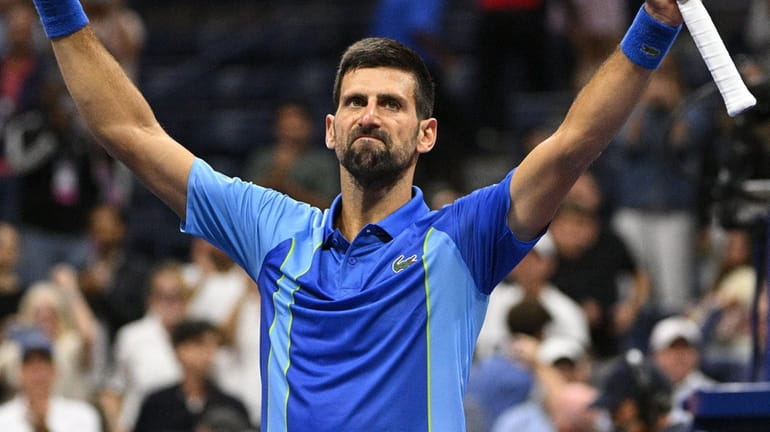Do we really need to be watching tennis at 1 a.m.? It depends on who you ask

Novak Djokovic reacts after winning his match against Laslo Djere during the third round of the U.S. Open at the USTA Billie Jean King National Tennis Center early Saturday. Credit: Kathleen Malone-Van Dyke
It happened again.
The most exciting match to be played at the U.S. Open this week ended long after most sane people had entered into a deep state of REM sleep.
It wasn’t until after 1:30 a.m. Saturday that Novak Djokovic was able to raise his arms in victory after battling back from two sets down to tame fellow Serb Laslo Djere, 4-6, 4-6, 6-1, 6-1, 6-3, in the third round.
“Unbelievable. It’s almost 2 a.m., a large number of people stayed,” Djokovic said after taking three hours and 45 minutes to defeat his opponent. “I hope they enjoyed the show, it was definitely not so enjoyable for me, especially in the first two sets.”
Djokovic did not seem to be bothered to be involved by playing into the wee hours of the night, but not all of his fellow tennis players are of the same mindset.
Fourth-seeded Elena Rybakina has not been the same since winning a quarterfinal match in Montreal last month that finished just before 3 a.m.
The 2022 Wimbledon champion has said the late night left her feeling “destroyed” and she has been playing since with some unspecified minor injuries. Since that match, she lost in the next round in Montreal, had to retire in the second round of the Western & Southern and most recently became the highest seed to be eliminated at the U. S. Open when she lost her third-round match to 30th-ranked Sorana Cirstea on Friday.
“It was horrible,” Rybakina said of her experience in Montreal. “It’s really tough to recover when you go to sleep at 5 a.m.”
Andy Murray made it clear early in the year that he is not a fan of late-night matches, after his five-set win over Thanasi Kokkinakis ended at 4:05 a.m at the Australian Open.
“I don’t think it helps the sport that much when everyone’s leaving because they have to go and get public transport home and you finish a match in front of 10% of the crowd,” he told the Guardian. “You don’t see it in other sports, so it’s clearly wrong.”
Wrong? That’s hard to say especially since there are some who see it as a unique and potentially exciting aspect of their sport.
“Late night tennis in New York City is synonymous with the U.S. Open,” said Lew Sherr, chief executive officer and executive director of the USTA, in a news conference before this year’s tournament. “It’s part of the excitement. In some respect it’s something that our fans love, right? The city that never sleeps.”
Indeed, some of the Open’s most exciting moments have come after midnight.
In 2005, Andre Agassi outlasted James Blake in a five-set quarterfinal that lasted nearly three hours. "At 1:15 in the morning for 20,000 people to still be here, I wasn't the winner, tennis was," Agassi told the crowd afterward. And last year, eventual champion Carlos Alcaraz set a tournament record for late nighters when he beat Jannik Sinner in a five-set quarterfinal that lasted more than five hours and concluded at 2:50 a.m. Alcaraz later admitted that he didn’t go to bed until 6 a.m. that morning.
The USTA did recently discuss the situation, but decided for now not to make any changes.
“Could we start the early session earlier, instead of 7, start it at 6?” asked U.S. Open tournament director Stacey Allaster in a news conference before the tournament. “We decided that’s not really a possibility because it’s hard for New Yorkers to get here even by 7. There could be a collision course with the afternoon. We talked about one match at night. We felt that was not fair to our fans.”
ESPN commentator John McEnroe understands that no one wants to be playing in the wee hours of the morning, but he added that the problem is really not that widespread.
“I think if you looked at the percentage of matches that went to 1 or 2, it would be very small, even though when Alcaraz played Sinner last year, it went to almost 3 in the morning and that seemed outrageous,” McEnroe said. “It’s about the ratings and when people get home from work.”
And it’s also about most of the complaints don’t seem to come from fans. Those who can’t stay up that late, don’t. Those who can, do so because they are likely watching something that has the potential to be epic, or it wouldn’t be going so late into the night.
Alcaraz, who could be playing Djokovic in the finals next weekend, did his own cost benefit analysis. Said Alcaraz, who defeated Daniel Evans Saturday to advance to the round of 16: “I watched the first two sets, then I had to go to sleep.”

